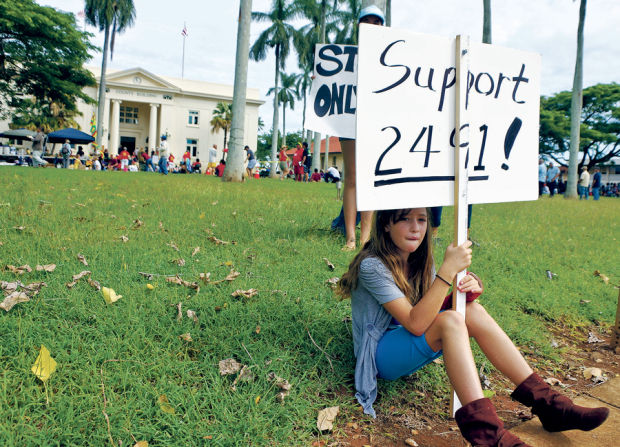LIHUE — Pending litigation, Ordinance 2491 is slated to take effect in nine months. Alicia Maluafiti, executive director of the Hawaii Crop Improvement Association, said Saturday’s 5-2 vote by the Kauai County Council to override the mayor’s Oct. 31 veto
LIHUE — Pending litigation, Ordinance 2491 is slated to take effect in nine months.
Alicia Maluafiti, executive director of the Hawaii Crop Improvement Association, said Saturday’s 5-2 vote by the Kauai County Council to override the mayor’s Oct. 31 veto was “disappointing,” but not surprising.
“We knew they were going to pass it,” she said. “I mean, they brought in a new council member to do that.”
Although reportedly legal under the County Charter, the council’s last-minute maneuvering to recess its Thursday meeting to allow time to appoint a seventh member drew fire from bill opponents.
Maluafiti said the next step for HCIA, a trade association representing the agricultural seed industry in Hawaii, is to begin participating in the Department of Agriculture’s new voluntary program for disclosing the use of Restricted Use Pesticides and implementing buffer zones.
The program, dubbed the Kauai Agricultural Good Neighbor Program, is set to go into effect Dec. 1 and apply to the five agribusinesses mentioned in 2491.
Those companies include DuPont Pioneer, Syngenta, BASF, Dow AgroSciences and Kauai Coffee.
“I think it’s exactly what the people of Kauai are looking for,” Maluafiti said of the voluntary program. “It really enables the companies to work with their neighbors to not just tell them what (pesticides) they’re using, but to educate them on its application.”
But supporters of the new county law argue the state’s announcement is insufficient, as it does not actually require the companies to do anything.
There are no fines, no criminal penalties, no enforcement.
While he believes the state program has many weaknesses, Councilman Gary Hooser, who co-introduced Bill 2491, said one of the biggest is that it only includes the disclosure of restricted use pesticides, while 75 percent of what the companies are using are general use.
Unlike 2491, Maluafiti said the voluntary program begins immediately, and therefore “defeats” the purpose of the county ordinance.
“(2491) had nothing to do with pesticide use reporting, because if it had they would have embraced the voluntary program,” she said. “It was about ridding the island of the seed companies.”
Peter Weideroder, the Kauai site leader for Dow AgroSciences, said Monday that his company was also disappointed in the council’s decision Saturday.
As for the state’s voluntary guidelines for pesticide reporting and buffer zones, Dow says it is willing to participate and continue its efforts to address community concerns.
“We appreciate the opportunity to share information about our responsible use of crop protection products and the important role of Hawaii agriculture in developing and producing abundant seed to help feed the growing world,” the company wrote in a statement. “We remain committed to being a good neighbor and a responsible steward of resources.”
Wayne Katayama, president and general manager of Kauai Coffee, said the company plans to “aggressively implement” the state program.
While his position has always been that 2491 was “poorly written,” Katayama said Kauai Coffee “will certainly comply with it” once it takes effect.
Attempts Monday to contact representatives of DuPont Pioneer, BASF and Syngenta were not successful.
Now passed, one major question lingers for 2491.
Will it result in the county being taken to court? And if so, who will come out on top?
From the get-go, attorneys representing the island’s biotech companies — including Paul Alston, an representative of Syngenta — have argued the bill is pre-empted by state and federal law.
Alston has assured the county it can expect a lawsuit.
In its recent statement, Dow said it agreed with the Kauai County Attorney’s Office and Mayor Bernard Carvalho Jr. that Ordinance 2491 is legally flawed.
“We are considering all of our legal options,” Dow wrote.
But Katayama said a lawsuit is not being discussed at Kauai Coffee.
“A lawsuit was never contemplated,” he said. “And I believe that is the worst way of settling things.”
Hooser said Monday he is not convinced the threat of lawsuit is anything more than just that. And if the companies do follow through on their word, he said it won’t do much for their image.
“It will look like what it is,” he said.
Maluafiti said the companies HCIA represents, as well as their employees, are tired and ready to move forward.
“The companies clearly want to work with the folks, and especially their neighbors, to alleviate their concerns,” she said. “Bill aside, the people of Kauai should put aside their differences and really work with the farmers on the island to find common ground. The Good Neighbor Program allows them to do that. And the companies want to do that.”
• Chris D’Angelo, environmental reporter, can be reached at 245-0441 or cdangelo@thegardenisland.com.


